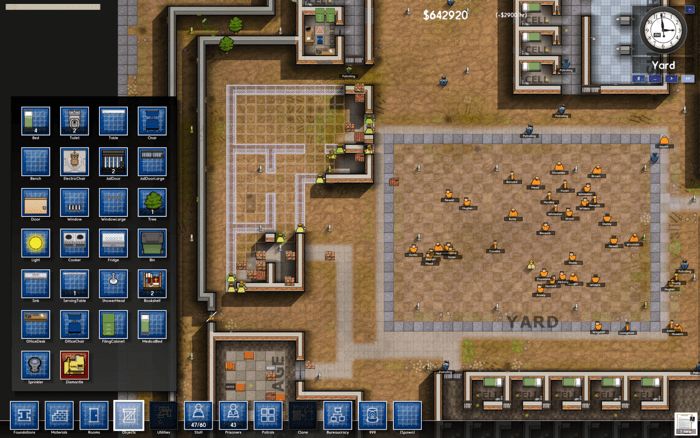
Gaming company Introversion Software has made $1.5 million through SendOwl
Here's their story - and some useful tips about making it big

Introversion Software was founded back in 1997 when four guys met at university. Fast forward a few years, and Introversion has five games under its belt, the last of which, Prison Architect, has been hugely successful. Managing director Mark Morris tells me where they find their inspiration, how they marketed their games and why he’s been blown away by the power of the internet.
SendOwl: Mark, could you tell us a bit about yourself, your company and your most recent — and incredible successful — new game, Prison Architect?
Mark: Yes, sure. We're a very small team. There are only four of us full time. We met back in 1997 at Imperial College, and one of the four of us was a big video game player and, it turned out, a creator of games. He made a hacking game called Uplink. Toward the end of university, back in about 2001, we decided that we would have a crack at selling Uplink for profit. That's exactly what we did. We made enough to make a second game, a game called Darwinia. That did okay, and we made a third game called DEFCON, which did very well, and then a fourth game called Multiwinia.
The last game that we released, and that we're still working on now, is a game called Prison Architect, which is all about building and managing a maximum security prison. We released that in a very early Alpha stage back in September 2012 through SendOwl. We've been amazed with the success and the interest in the game. Just looking at the stats now, we've made nearly $1.5m through SendOwl. We've been absolutely blown away.
SendOwl: Wow. $1.5m for a team of four, did you say?
Mark: Well, four, yes, but credit where it's due. There are quite a few freelancers involved now. We've got a sound guy, other programmers, an art guy and a writer. We've been able to expand the team to correspond to the interest within the game.
SendOwl: Okay. I've got to ask. What was the inspiration for the game? You're sat around building a prison. How did you come up with the idea?
Mark: It was born from a failed project called Subversion, which is another game that we were working on for a while, which was all about hi-tech heists in a city. We'd written some code to automatically create cities and one of the missions that we were working on, within this kind of world, was breaking somebody out of a prison. Chris was struggling with this game as a whole, and he took a couple of weeks off. He went to San Francisco with his wife and went to Alcatraz and looked around; he just looked at the systematic way in which a prison operates. For example, it had all these big levers that you could pull and it would open all of the doors at the same time. He thought: "This is very amenable to a computer simulation. It's something that we could look into.”
SendOwl: How long did you spend developing this game before you actually got to the launch?
Mark: We were in development for about a year, but we were really trying to understand how best to launch the game. In the games industry things changed a lot in 2010-2012. A company called Humble Bundle had started introducing pay what you want for bundles of Indie games, so you could pay as little as a cent. Contrary to what everybody thought would happen, people paid around $5-6 in their hundreds or thousands, so these bundles were making millions of dollars. There was also Kickstarter.
SendOwl: But you didn’t go for Kickstarter?
Mark: The two questions they ask you – How much money do you need for this project? How long do you want to run your campaign for? – were ones that we didn't want to answer. But we thought, "People understand Kickstarter. They understand this idea of asking for money in order to make a product a reality." We're not going to limit how much we're asking for and we're not going to set a time limit because if we don't achieve it, we can continue to develop the game. After a good few months of Googling, I eventually found you guys, and we launched our Kickstarter-inspired website.
SendOwl: So how do you go about getting the initial publicity to get this snowball rolling?
Mark: We had been in the industry for quite a while, so we had a relatively good list of journalists that we could reach out to, but actually, if I'm being completely honest, we were a bit nervous because we didn't know how well this was going to do at all. We didn't want to do a big press release, a big push, because we thought, "If this fails, we're going to look like complete clouts".We only told about five or six journalists in the UK, something like that, on big VA gaming sites, but not many. Rock, Paper, Shotgun was one. PC Gamer. I think PC Games; I can't remember the exact list, but it wasn't many at all because we just wanted to dip our toe in the water. We sold something like $100,000 worth in about the first three days, so we were absolutely blown away and astonished by it – by the power of the internet.
SendOwl: Was there a few beers had that evening?
Mark: There were beers, but there were also a lot of coding going on at the same time because we were not set up to deal with that kind of load – which is never a good mix.
SendOwl: You also sell from a platform called Steam. Can you explain what that is? I'm sure a lot of people will be interested.
Mark: I describe it to the layman as sort of like the iTunes of PC/Mac/Linux video gaming. Steam provides curation of your catalogue of games, so once you've bought a game on Steam, it keeps a record that you've bought that game. You don't need to worry about actually keeping track of the files themselves. It also has a number of other features: it supports achievement in-game chat and moding and marketplaces and all sorts of things. It accounts for probably 95% of PC video game sales now. App stores do very well for some casual gaming titles and obviously apps, but Valve — the company that make Steam — are basically, the go-to guys for PC, Mac and Linux gaming nowadays.
SendOwl: As well as selling through Steam, you sell through your own website using SendOwl. So why did you choose SendOwl?
Mark: SendOwl is so great for us because of the real simplicity, but flexibility, within the license key model. Each game we sell is a package and within the package there are products which are PC executable, Mac executable and the linux.tar.gz. — but there are also license keys. There's the license key for activation on Steam and also on our website we offer various customisations. If you want to pay a little bit more money, you can actually name a prisoner. You can write a prisoner's bio, a short description of why he's in prison. If you want to pay a little bit more, we'll get our artist to paint a picture of you. Customers send in a photograph of themselves and our artist actually recreates that image in a Prison Architect-style prisoner. In order to activate those functionalities we use license keys. Those license keys are embedded in SendOwl.

SendOwl: So you sell quite a few different Prison Architect packs?
Mark: That’s right. The Prison Architect base pack, which is just Prison Architect on its own, is $30. The most expensive tier that we went for was a $1,000 tier. For $1000 you can customise a warden. They were $1,000 each and we thought: "That's too much. Who is going to want to give us $1000?" We had a limit of five, and we sold six of them in about twenty minutes.
This is the key message: There are people in the world that really do want to support us in making this video game. For those people, $1,000 is obviously something they're willing to pay, so it was quite an eye-opener for us.
SendOwl: It is amazing that people will fall in love with a company. I remember once in the early days, a guy emailed and just said: "I love your platform. I've been using SendOwl for ten minutes. This is unbelievable. I've spent all day trying to find something that can do this. Can I just send you and your company some beers?" I said: "We're in the UK actually." He was like, "Don't worry, I'm going to PayPal you $50 right now. Go out and get a crate of your favorite beers for the team." We’d saved this guy a lot of hassle and he was more than happy to just send some beer our way.
Mark: Yeah, absolutely. It's amazing and I think it's the world we live in. If you provide a good service to people, they can be incredibly happy with it.
SendOwl: I just want to ask you one more question before we wrap up the interview: If you could offer one piece of advice to fellow Indie gamers that are just starting out and looking to create their first game, what would it be?
Mark: People are going to think that we pre-scripted this but genuinely, I've run this business since 2001 and I'm asked that a lot! I tell people: "You need to be selling your game from your website." That is the absolute basic first thing that I would tell you to do because then you've got a revenue stream directly from customers, directly into your bank, with nobody else sat in the middle, no contracts, no legal, nothing like that. Obviously, there are contracts, but you don't need to negotiate complex publishing agreements.
If your game doesn't sell very well, you're probably making a clanger so stop and move on to something else. If it is selling well, you're going to be getting the money from that immediately with zero lag that you can use to keep yourself afloat while you go and negotiate with Valve or a publisher or whoever it is that you're going to do. It basically gives you all the options that you need to move your business forward.
I then tell people you need to go and use SendOwl: simple as that. My advice is: it doesn't matter whether you're on Steam or you've got relationships with other people. If you're not selling it from your site, start selling it from your site immediately and use SendOwl to do it.

Matt Wells is the Head of Operations at SendOwl, a digital product delivery and access solutions for creators, solopreneurs and SMBs. An accomplished entrepreneur and technologist, he has founded multiple companies, including Virtual Value and Shujinko. Throughout Matt's career, he has built and led high-performing teams that consistently deliver world-class software solutions. With deep expertise in cloud engineering, infrastructure, and security, Matt has held impactful roles at Starbucks, CARDFREE.
community
